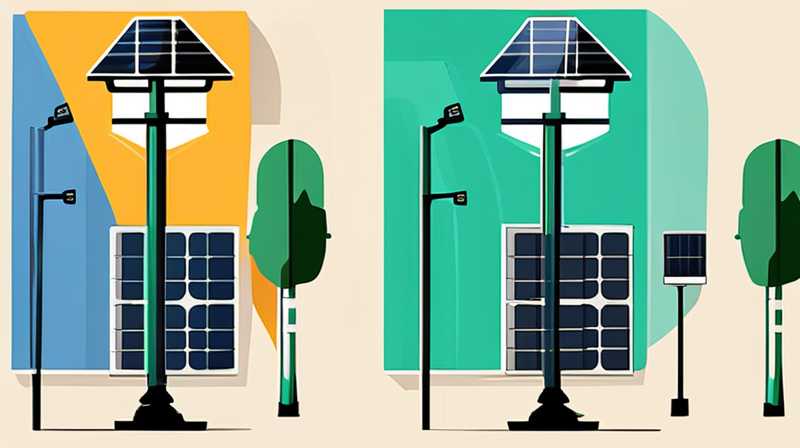
1. Recycling solar panels affixed to street light poles typically incurs costs ranging from $20 to $50 per panel, influenced by factors such as local facility rates, transportation fees, and the proximity of recycling facilities. The process of recycling these panels includes several considerations, including the condition of the panels and the methods utilized for their extraction and recycling. Proper removal and recycling are essential as they mitigate landfill waste, prevent environmental pollution, and recover valuable materials.
2. In many urban areas, the increasing reliance on solar energy for street lighting has prompted discussions surrounding the appropriate handling and recycling of the solar panels themselves when they reach the end of their operational life. Municipalities must understand not only the financial aspects but also the environmental implications of not properly recycling these panels.
3. COST FACTORS OF RECYCLING SOLAR PANELS ON STREET LIGHT POLES
When examining the expenses linked with recycling solar panels mounted on street lamp standards, various components come into play. The primary financial consideration is the local recycling facility’s operational fees. In urban settings, these costs can fluctuate significantly based on demand, logistics, and available technology for recycling. For instance, in regions where sustainability practices are prioritized, there may be more competitive pricing, whereas areas lacking such services might charge higher rates due to fewer available facilities.
Moreover, transportation expenses are another crucial element. Transporting panels from the street light installation sites to recycling centers adds to the overall expenditure. This is particularly relevant for municipalities that are geographically spread out or experience difficulties in coordinated waste collection and transportation. Thus, assessing proximity to recycling facilities can greatly affect the total cost of disposal.
Lastly, the condition and type of solar panels being recycled also influence pricing. Certain panels contain materials that can be hazardous, necessitating specialized handling procedures and fees. If panels are broken or damaged, additional charges may arise for their safe disassembly and recycling processes, which could drive up the overall expenses incurred by municipalities or organizations responsible for such panels.
4. ENVIRONMENTAL IMPACT OF SOLAR PANEL RECYCLING
Recognizing the environmental implications of recycling solar panels is critical. Proper recycling assists in conserving resources and reducing pollution. Solar panels contain various materials, including silicon, metals, and glass, that can be valuable if reclaimed appropriately. By recycling these components, municipalities lessen the need for raw material extraction, which often results in significant ecological degradation.
Moreover, improper disposal of solar panels can lead to serious environmental hazards. If panels land in landfills, toxic substances within them can leach into soil and groundwater, creating long-term environmental risks. Hence, municipalities have the monumental task of ensuring that their solar panel programs are sustainable throughout the lifecycle of installations. This involves developing robust recycling programs that not only address cost-efficiency but also prioritize ecological conservation.
5. THE PROCESS OF RECYCLING SOLAR PANELS
Understanding the methodology of recycling solar panels is essential for effective management of these resources. The recycling process generally involves several stages, starting with the careful removal of panels from street light poles. This step necessitates specialized training and tools to ensure that both the panels and the poles are not damaged during extraction. Damage during this phase can result in additional costs or reduced recycling value.
Following extraction, the panels undergo a detoxification process wherein hazardous components are removed or neutralized. This process is pivotal in ensuring that no harmful materials contaminate the surrounding environment. Post-detoxification, the actual recycling process occurs, where panels are deconstructed, and materials are sorted for refurbishment or reuse. Each of these phases requires a strategic approach and compliance with local environmental regulations, thus adding layers of complexity and additional costs to the overall recycling initiative for municipalities.
6. LEGISLATION AND POLICIES AFFECTING SOLAR PANEL RECYCLING
Government regulations and legislation pertaining to energy resources and waste management are key determinants in the recycling landscape for solar panels. National policies increasingly emphasize sustainability and eco-friendly practices. Many countries have introduced guidelines and mandates that directly impact how municipalities handle electronic waste, including solar panels.
Additionally, local governance can enforce specific measures or create incentives aimed at proactive recycling efforts. Such initiatives may include grant programs or subsidies to defray costs associated with the recycling process. Awareness and education surrounding these regulations can also empower municipalities to make more informed decisions regarding their solar energy resources, impacting their budgeting as they plan for future expenditures in recycling.
7. CASE STUDIES FROM DIFFERENT MUNICIPALITIES
Examining real-world examples provides valuable insights into the various strategies employed by local governments. For instance, in California, a progressive approach has been established, where recycling efforts are combined with public awareness campaigns. By emphasizing the importance of sustainability, municipalities can foster community engagement, which ultimately helps offset some of the costs associated with recycling processes.
Alternatively, a city in Texas found that streamlining their recycling operations significantly reduced expenses. By partnering with local recycling facilities to create a fixed-price per panel program, they enhanced efficiency and predictability in budgeting for recycling. Such case studies underscore that proactive planning and cooperation can yield better outcomes in managing financial resources while promoting environmental health.
8. FUTURE TRENDS IN SOLAR PANEL RECYCLING
The landscape for solar panel recycling continues to evolve with new technologies. Advancements in recycling techniques are expected to reduce costs and improve material recovery rates. Innovations in processes such as automated panel disassembly can further lower labor expenses while boosting efficiency. Additionally, the advancement of recycling technology is expected to bolster the economic feasibility of repurposing materials extracted from old solar panels, essentially creating a circular economy around solar energy.
Furthermore, as the global emphasis on renewable energy grows, more resources may be allocated to the development of sustainable recycling initiatives. Partnerships between technology firms and recycling companies may lead to novel solutions that address some of the existing challenges comprehensively. Such synergistic exchanges could foster an environment wherein municipal costs decline, thus incentivizing broader adoption of solar energy solutions.
FREQUENTLY ASKED QUESTIONS
- WHAT MATERIALS ARE RECOVERED FROM RECYCLED SOLAR PANELS?
Recycling solar panels allows for the recovery of several valuable materials. Silicon, glass, and various metals like aluminum and copper are among the primary components extracted during the recycling process. Silicon, in particular, is crucial because it is the primary material used in photovoltaic cells that generate electricity. Moreover, approximately 90% of a solar panel is recyclable, thus promoting efficient resource recovery while reducing the environmental burden.
The recycling process involves extensive sorting and processing to separate these components. Glass, for example, can be cleaned and reused in new panel production, while metals can be melted down and repurposed for a range of applications. The value of these recycled materials not only minimizes raw material extraction but also contributes to cost-effective manufacturing processes for new solar installations, thus establishing a sustainable cycle.
- IS THERE A NEED FOR SPECIALIZED FACILITIES FOR SOLAR PANEL RECYCLING?
Yes, specialized recycling facilities are essential for the effective management of solar panel waste. These facilities possess advanced technology and trained personnel capable of safely processing solar panels, especially given that some components can be hazardous. Workers must comply with regulations designed to mitigate potential risks associated with toxic materials, such as cadmium or lead, which may be present in certain types of panels.
Additionally, specialized facilities are equipped to extract valuable components efficiently, maximizing material recovery. Ordinary waste recycling centers may lack the technology and expertise required to handle solar panels appropriately, leading to sub-optimal recycling outcomes and possible environmental contamination. Therefore, ensuring access to certified facilities is crucial for municipalities looking to implement sustainable recycling practices.
- HOW CAN MUNICIPALITIES REDUCE THE COST OF SOLAR PANEL RECYCLING?
Municipalities can implement various strategies to lower the expenses associated with solar panel recycling. One effective approach is to form partnerships with established recycling facilities to negotiate bulk pricing. By consolidating waste from multiple street lighting sources, municipalities can leverage their collective buying power to secure better rates for recycling services.
Additionally, adopting community awareness programs can engage the public concerning recycling initiatives. Educating residents on the importance of proper disposal can lead to increased participation in recycling efforts, ultimately lowering costs related to waste management. Moreover, investing in infrastructure dedicated to training personnel for efficient extraction and recycling processes can optimize resource use and reduce long-term expenses.
The financial landscape for recycling solar panels on street light poles encompasses multifaceted considerations that require a comprehensive approach. Evaluating associated costs, environmental impacts, methodologies, and regulatory frameworks helps organizations navigate this complex terrain. By understanding the intricacies involved and leveraging collaborative partnerships, municipalities can foster sustainable recycling practices. These efforts not only mitigate financial burdens but also promote ecological integrity as solar energy continues to gain traction. As technologies expand and regulations evolve, proactive strategies become indispensable for effective management of solar panel lifecycle. This nexus between innovative solutions and sound waste management practices fortifies communities’ commitment to sustainability and environmental stewardship, ultimately paving the way for a cleaner, greener future.
Original article by NenPower, If reposted, please credit the source: https://nenpower.com/blog/how-much-does-it-cost-to-recycle-solar-panels-on-street-light-poles/











